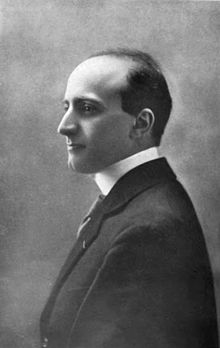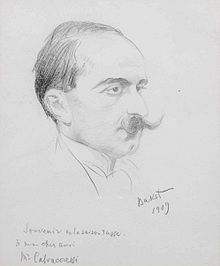Michel-Dimitri Calvocoressi

Michel-Dimitri Calvocoressi (2 October 1877 – 1 February 1944) was a French-born
Born in Marseille, Calvocoressi learned numerous languages in his youth and attempted various careers before settling on music criticism. His early career was spent as an influential music critic in Paris, where he contributed to English and French newspapers: Gil Blas, the Comoedia Illustré, The Morning Post and The Musical Times, among others. He was well acquainted with the city's musical figures, particularly Maurice Ravel. Alongside Ravel and the pianist Ricardo Viñes, Calvocoressi founded the Apaches musical society.
After serving as a
Early life and education
Michel-Dimitri Calvocoressi was born in
Alongside his piano lessons with Eugène Claveau, Calvocoressi frequented the Parisian concert scene, with works by
Career and later life

Calvocoressi's music criticism career can be divided into two: a French (1902–1914) and English (1921–1944) period.[12] Described by Abraham as "a remarkable polyglot", Calvocoressi's career beginning in 1902 was as a music critic and correspondent for several English, American, German and Russian periodicals.[2] Encouraged by the novelist Binet-Valmer, the latter introduced him to Octave Maus, an editor of the monthly L'Art Moderne magazine.[4] Calvocoressi became the Paris musical correspondent for L'Art Moderne and music critic for Binet-Valmer's La Renaissance latine magazine; around then he also was music critic for the Anglo-French Weekly Critical Review.[4] Although some of these publications became obsolete in the next few years, Calvocoressi was well established enough to be unaffected.[13] He contributed to other publications and various time: the daily Gil Blas, the fortnightly Comoedia Illustré (part of Comœdia), the daily The Morning Post and particularly monthly Musical Times.[12]
Calvocoressi published his first book—a study on
Calvocoressi paused music criticism at the onset of
Selected writings
Books
- Calvocoressi, Michel-Dimitri (1905). Franz Liszt: Biographique Critique [Franz Liszt: Critical Biography]. Les Musiciens célèbres (in French). Paris: H. Laurens. OCLC 1135190659.
- —— (1908). Moussorgsky. Maîtres de la musique (in French). Paris: OCLC 3797891.
- —— (1911). Glinka. Les Musiciens célèbres (in French). Paris: H. Laurens. OCLC 1142939.
- —— (1912). Schumann. Les écrits et la vie anecdotique et pittoresque des grands artistes (in French). Paris: Société des éditions Louis-Michaud. OCLC 8641346.
- —— (1923). Charles Koechlin (in French). Paris: M. Senart. OCLC 19949660.
- —— (1923). The Principles and Methods of Musical Criticism. London: OCLC 558073283.
- —— (1925). Musical Taste and How to Form it. London: OCLC 909990.
- —— (1933). Musicians Gallery: Music and Ballet in Paris and London. London: OCLC 2535873.
- ——; OCLC 926146.
- —— (1944). Debussy. London: OCLC 1448206.
- —— (1944). A Survey of Russian Music. Harmondsworth: OCLC 558073294.
- —— (1946). Mussorgsky. London: OCLC 1559285.
- —— (1956). Mussorgsky: His Life and Works. London: Rockliff. OCLC 2048876.
Articles
- Calvocoressi, Michel-Dimitri (1 December 1913). "Maurice Ravel". JSTOR 907706.
- —— (October 1921). "The Practice of Song-Translation". JSTOR 726587.
- —— (January 1941). "When Ravel Composed to Order". JSTOR 727827.
- —— (July 1922). "The Unknown Mussorgsky". JSTOR 726236.
References
Notes
- Lycée Janson de Sailly is variously reported in modern sources. The musicologist Gerald Abraham first records that he studied philosophy under André Lalande,[4] but later says it was classics and that he "entered the law faculty but soon abandoned law".[2]
- ^ Ravel later orchestrated this movement in 1919[6]
- ^ Other members were the composers Florent Schmitt, Maurice Delage and Paul Ladmirault, the poets Léon-Paul Fargue and Tristan Klingsor and the painter Paul Sordes[9][10][11]
Citations
- ^ The Concise Oxford Dictionary of Music 2013.
- ^ a b c d e f g h i j k l m Abraham 2001.
- ^ Jacobs 2002, § para. 1.
- ^ a b c d e f g h i Abraham 1944, p. 83.
- ^ Huebner 2011, pp. 20–21.
- ^ Kelly 2001.
- ^ Abraham 1944, pp. 84–45.
- ^ Goubault 1984, p. 40.
- ^ Pasler 1982, p. 403.
- ^ Nichols 1977, p. 20.
- ^ Orenstein 1991, p. 28.
- ^ a b c d e f Abraham 1944, p. 84.
- ^ Abraham 1944, pp. 83–84.
Sources
- Books
- Goubault, Christian (1984). La Critique Musical dans la Presse Français de 1870 à 1914 (in French). Geneva: Editions Slatkine. ISBN 9782051005425.
- Huebner, Steven (2011). "Ravel's Poetics: Literary Currents, Classical Takes". In Kaminsky, Peter (ed.). Unmasking Ravel: New Perspectives on the Music. Rochester: ISBN 978-1-58046-337-9.
- ISBN 978-0-460-03146-2.
- Orenstein, Arbie (1991) [1975]. Ravel: Man and Musician. Mineola: Dover. ISBN 978-0-486-26633-6.
- Articles
- JSTOR 921571.
- ISBN 978-1-56159-263-0. (subscription or UK public library membershiprequired)
- ISBN 978-1-56159-263-0. (subscription or UK public library membershiprequired)
- doi:10.1093/gmo/9781561592630.article.52145. (subscription or UK public library membershiprequired)
- ISBN 978-0-19-920383-3.
- Pasler, Jann (June 1982). "Stravinsky and the Apaches". JSTOR 964115.
Further reading
External links
- Articles by Calvocoressi on JSTOR
- The Michel-Dmitri Calvocoressi Manuscripts – Special Collections at the University of Maryland
- Michel-Dimitri Calvocoressi discography at Discogs
